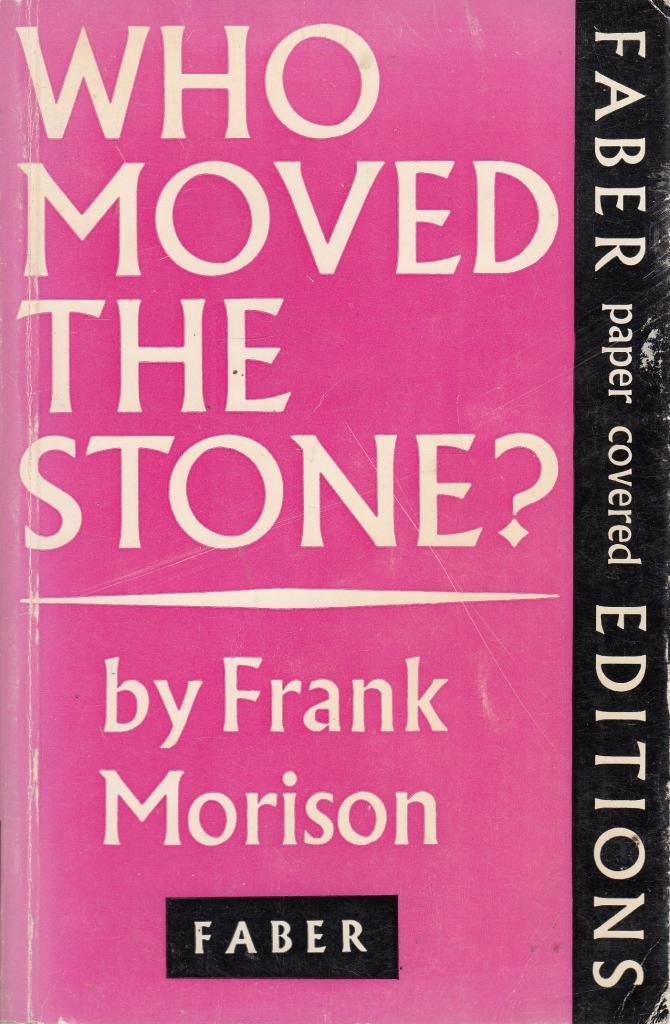About this deal
Bothersome early in the book is that the author limits his analysis of the trial process. You could be mistaken for thinking there to be only two stages in the trial (before the church and before Roman authority) whereas there were other stages (e.g. before Herod). a b c d "Mr. A. H. Ross (Obituaries)". The Times. London, England. 23 September 1950. pg. 8; col. F; Issue 51804 . Retrieved 1 June 2011. Last Easter week, I decided it'd be appropriate to reread this famous work of Christian apologetics. Morison, an atheist journalist (and colleague of Dorothy Sayers'), started looking into Jesus' death to try to write a materialistic account of what must've really happened, but during his investigation he became convinced that Jesus really did rise from the dead. This book is the result of his investigation.
Morison dispenses with arguments that it was a mistake or a hoax. Despite a somewhat plodding delivery, he plausibly discusses motivations and fills in gaps in the story, and brings it to life in a way more compelling than any film rendition I've ever seen. (Indeed, I'm tempted to try my own hand at writing a screenplay based on this.) These temple guards saw Christ and hence why the story was made up about the disciples robbing the body See Rev. D. Gardner Miller, “Who Moved The Stone?” Otago Daily Times, August 9 1930, 27.“Talks With Young Men,” Australian Christian Commonwealth, April 27, 1934, 10; “The Triumph of Easter,” Queensland Times, April 16, 1938, 11.“The Glorious Message of Easter: He Is Alive,” Derby Evening Telegraph, Saturday, April 16 1949, 3.
If this book helps anyone to do that, we thank God for it. But I wouldn't recommend this book be used for that end.
The idea that God LOST whole portions of His Book is something only a modern Laodicean would be spiritually dumbed-down enough to believe. And don't even attempt to correct me by saying He simply "allowed" it to be lost. It's His word. God PROMISED to keep it. See Psalm 12:6-7, Matthew 24:35, etc.Many people have gone out to write a book that Morison has attempted to write and some of these books have also been published, however the difference is that Morison went into his project with an open mind. Many of the other writers (who will not be named) have not done this. They already have a direction they wish to head, and will simply make point of fact statements (such as the gospels being unreliable) without actually digging much deeper to provide supporting evidence as to why they believe that the gospels are unreliable. In attempting to unravel the tangled skein of passions, prejudices, and political intrigues with which the last days of Jesus are interwoven, it has always seemed to me a sound principle to go straight to the heart of the mystery by studying closely the nature of the charge brought against Him.
Ultimately, two facts narrow down the options. First, there was no body and no occupied grave that anyone could point to in rebutting the claim that he had risen. Surely, a lot of people would have had motivation to do so if they could. "Think of the highly placed Sadducees who were prepared to go to almost any length to discredit and overthrow the cause." Secondly, there is no likely scenario in which anyone removed the body and kept quiet about having done so. Finally, there is the utter transformation in the behavior of the disciples. At the time of the Crucifixion they were scattered, frightened, disillusioned. Shortly thereafter they were loudly and fearlessly proclaiming the Resurrection. Who Moved the Stone" by Frank Morison is an ultimate example of an individual's dedication to delving in to a subject and discovering its truth, or as much of its truth as possible. Morison not only provided the information he uncovered he explained throughout the work the meticulous process he undertook in his research. He also explained his logic and reasoning for the conclusions he formulated. Of course, the subject matter in this case is quite a complex one and made more complicated by the years that have passed since the actual events occurred. The subtitle of Morison's book is "A Skeptic Looks at the Death and Resurrection of Christ," which indicates that Morison had a personal impetus in writing this book. He was apparently personally intrigued by the mysteries surrounding the events of the four days between Holy Thursday and Easter Sunday and compelled to try to determine exactly what took place. He is trying to prover the historicity of the phrase in the apostles creed ‘on the third day he rose again’ Ross Clifford, Leading Lawyers’ Case for the Resurrection (Edmonton, Alberta, Canada: Canadian Institute for Law, Theology and Public Policy, 1996), 120-123. ISBN 1-896363-02-4J. H. Jowett M.A., D.D.: A Character Study (London: James Clarke, 1911) available at Internet Archive The next morning, Jesus was taken to the Roman Court where the typically harsh and merciless Pilate seemed to have had a change of disposition. Morison speculated that Pilate's wife, Claudia, was sympathetic to Jesus and had a dream about him that made her fearful for her husband to be involved in his crucifixion. She apparently influenced him which made him tentative and resistant in taking the case. He tried to pass it off to Herod and attempted to exchange Jesus' fate with that of a serial murderer named Barabbas but to no avail. The case was his and he was tied to Jesus' destiny for all time.
 Great Deal
Great Deal 